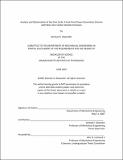Analysis and optimization of the Graz cycle : a coal fired power generation scheme with near-zero carbon dioxide emissions
Author(s)
Alexander, Brentan R
DownloadFull printable version (3.576Mb)
Alternative title
Coal fired power generation scheme with near-zero carbon dioxide emissions
Other Contributors
Massachusetts Institute of Technology. Dept. of Mechanical Engineering.
Advisor
Ahmed F. Ghoniem.
Terms of use
Metadata
Show full item recordAbstract
Humans are releasing record amounts of carbon dioxide into the atmosphere through the combustion of fossil fuels in power generation plants. With mounting evidence that this carbon dioxide is a leading cause of global warming and with energy demand exploding, it is time to seek out realistic power production methods that do not pollute the environment with CO2 waste. The relative abundance and low cost of fossil fuels remains attractive and clean coal technologies are examined as a viable solution. This paper helps identify the many options currently available, including post-combustion capture, pre-combustion capture, and a number of oxy-fuel combustion schemes. One cycle design in particular, the Graz cycle, holds some promise as a future power generation cycle. A model of the Graz cycle developed in this paper predicts a cycle efficiency value of 56.72%, a value that does not account for efficiency losses in the liquefaction and sequestration of carbon dioxide, or the efficiency penalty associated with the gasification of coal. This high efficiency number, coupled with the low technological barriers of this cycle compared to similar schemes, is used as a justification for investigating this cycle further. (cont.) A sensitivity analysis is performed in order to identify key system parameters. Using this information, a computational optimization algorithm based on a simulated annealing scheme is devised and used to alter the parameters until an overall efficiency of 60.11% is achieved. Another optimization scheme which accounts for hardware limitations and plant capital costs is also discussed. This optimization yields a total efficiency of 58.76% while limiting the system high pressure to 110 bar. With such high efficiency values for this cycle, it is suggested that further study with more advanced models be conducted to better assess the viability of the Graz cycle as a clean technology.
Description
Thesis (S.B.)--Massachusetts Institute of Technology, Dept. of Mechanical Engineering, 2007. This electronic version was submitted by the student author. The certified thesis is available in the Institute Archives and Special Collections. Includes bibliographical references (leaves 91-93).
Date issued
2007Department
Massachusetts Institute of Technology. Department of Mechanical EngineeringPublisher
Massachusetts Institute of Technology
Keywords
Mechanical Engineering.